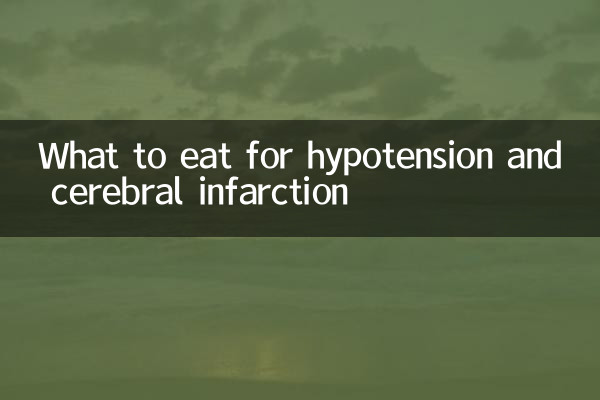What to eat for patients with hypotension and cerebral infarction: scientific dietary guidelines and analysis of hot topics
Among the health topics hotly discussed on the Internet recently, the prevention and treatment of hypotension and cerebral infarction have become the focus. Especially in autumn and winter, when cardiovascular and cerebrovascular diseases occur at a high rate, how to regulate hypotension and prevent cerebral infarction through diet has attracted much attention. This article will combine the hot content of the past 10 days to provide you with structured data and practical suggestions.
1. Dietary principles for patients with hypotension and cerebral infarction

Patients with hypotension and cerebral infarction need to pay special attention to nutritional balance. The following are the core dietary principles:
| principles | Specific instructions |
|---|---|
| Moderate high-sodium diet | Daily salt intake can be increased to 6-8g (doctor’s advice required) |
| High quality protein supplement | Daily protein intake 1.2-1.5g/kg body weight |
| Well hydrated | Drink 2000-2500ml of water daily (for those with normal heart function) |
| Eat small meals often | Eat 5-6 meals a day to avoid lowering blood pressure caused by fullness |
2. Recommended food list (combined with the latest research)
Based on the recent updates to the "China Stroke Prevention and Treatment Guidelines", the recommended ingredients are compiled:
| food category | specific food | Efficacy description |
|---|---|---|
| Boost foods | Yams, red dates, longan | Promote blood circulation and gently increase blood pressure |
| Brain food | Deep-sea fish, walnuts, eggs | Rich in Omega-3 and Lecithin |
| iron supplement foods | Animal liver, spinach, black fungus | Improve anemic hypotension |
| electrolyte foods | Banana, coconut water, seaweed | Regulate body fluid balance |
3. Relevance of recent hot topics
1.Internet celebrity "ketogenic diet" controversy: Experts point out that a very low-carbohydrate diet may worsen hypotension, and patients with cerebral infarction should maintain an appropriate amount of carbohydrate intake (not less than 130g per day).
2.New functional food: A brand has launched dark chocolate containing flavonoids, which research shows may improve cerebral blood flow (20-30g is recommended daily).
3.Seasonal Diet Modifications: Hot searches during the cold wave show that searches for warm ingredients such as ginger and cinnamon increased by 300%. Adding them in appropriate amounts can help maintain blood vessel tension.
Four and three-day reference recipes (audited by the nutrition department of a tertiary hospital)
| Meals | first day | The next day | The third day |
|---|---|---|---|
| breakfast | Longan porridge + boiled eggs + cold spinach | Whole wheat bread + avocado + low salt cheese | Yam and millet porridge + steamed fish cake |
| lunch | Braised beef + brown rice + garlic broccoli | Salmon Salad + Quinoa Rice | Codonopsis pilosula black chicken soup + buckwheat noodles |
| dinner | Shrimp tofu + seaweed soup | Lamb stewed with radish + multigrain steamed buns | Steamed seabass + mushrooms and rapeseed |
| Extra meal | nut yogurt | Red dates and white fungus soup | black sesame paste |
5. Special precautions
1. Avoid eating grapefruit, carambola and other fruits together with antihypertensive drugs. The recent warning issued by the Food and Drug Administration has triggered heated discussions.
2. The dosage of Internet celebrity "superfoods" such as chia seeds needs to be controlled (≤15g per day). Excessive consumption may cause blood pressure fluctuations.
3. The latest research shows that the Mediterranean diet can reduce the risk of recurrence of cerebral infarction by 22%. It is recommended to refer to its combination of olive oil, deep-sea fish, and nuts.
Note: The data in this article are compiled from the National Health Commission's 2023 Stroke Prevention and Treatment Report, the International Society of Hypertension Guidelines, and the hot discussions on the Internet in the past 10 days. The specific dietary plan needs to be formulated by professional physicians based on individual circumstances.

check the details

check the details